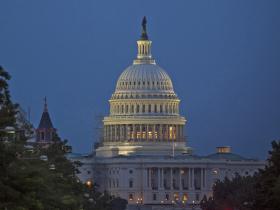Climate change helped cause Brexit, says Al Gore
Former Vice President echoes warnings from US military that global warming is causing dangerous political instability
- Ian Johnston Environment Correspondent
- @montaukian
- 179 comments
|
|
|
|
Click to follow
The Independent Online
The Independent Online

Brexit was caused in part by climate change, former US Vice-President Al Gore has said, warning that extreme weather is creating political instability “the world will find extremely difficult to deal with”.
Mr Gore, speaking at an event in which he previewed a sequel to his landmark 2006 documentary, An Inconvenient Truth, said the “principal” cause of the Syrian Civil War had been the worst drought in 900 years, which forced 1.5 million people to move from the countryside to the cities.
There they met a similar number of Iraqis who had fled the conflict in their homeland, creating powder keg conditions that Syrian government officials privately feared would explode.
READ MORE
The resulting war brought more refugees into Europe, causing political instability and helping convince some in the UK to vote to leave the European Union.
One of the most controversial Leave campaign posters showed a queue of refugees stretching into the distance with the caption “Breaking point: The EU has failed us all”. The then-Chancellor, George Osborne, described the poster as “disgusting and vile” and, like others who explicitly compared it to Nazi propaganda, said it had “echoes of literature used in the 1930s”.
Mr Gore, whose new film An Inconvenient Sequel: Truth to Power is due out in the UK in August, told an audience at the Advertising Week Europe event in London: “This collision between the power of industrial civilisation and the surprising fragility of the Earth’s ecosystem now poses a great danger that could even threaten the future of human civilisation itself.
“One of the lines of investigation [scientists] have been pursuing has led them to the conclusion that significant areas of the Middle East and North Africa are in danger of becoming uninhabitable.
“And, just a taste of this, to link it to some of the events that the UK and European Union are going through – think for a moment about what happened in Syria.
“Before the gates of hell opened in Syria, what happened was a climate-related extreme drought.
“From 2006 to 2010, 60 per cent of the farms in Syria were destroyed… and 80 per cent of the livestock were killed. The drought in the eastern Mediterranean is the worst ever on record – the records only go back 900 years, but it’s historic.
“And 1.5 million climate refugees were driven into the cities in Syria, where they collided with refugees from the Iraq War.
“Wikileaks revealed the internal conversations in the Syrian government where they were saying to one another ‘we can’t handle this, there’s going to be a social explosion’. There are other causes of the Syrian civil war, but this was the principal one.”
Syr: Utrecht's restaurant staffed by refugees
The war broke out in 2011 as people took to the streets during the Arab Spring protest movement against dictators in the Middle East. President Bashar Assad responded by sending in the troops.
Mr Gore said this had produced an “incredible flow of refugees into Europe, which is creating political instability and which contributed in some ways to the desire of some in the UK to say ‘whoa, we’re not sure we want to be part of that anymore’”.
He said this kind of political instability was being felt by a number of countries around the world.
“Some countries have a hard time even in the best of seasons but the additional stress this climate crisis is causing really poses the threat of some political disruption and chaos of a kind the world would find extremely difficult to deal with,” Mr Gore said.
Inside the classroom with Chios's child refugees
This is a view shared by the current US Defence Secretary, General James “Mad Dog” Mattis.
Despite Donald Trump’s apparent dismissal of the problems being caused by climate change, the US military is taking the issue seriously.
Mr Mattis made this clear in comments to US Senators as he sought their confirmation of his appointment.
“Climate change is impacting stability in areas of the world where our troops are operating today,” he said.
“It is appropriate for the combatant commands to incorporate drivers of instability that impact the security environment in their areas into their planning.
Refugees welcome here: Protesters demand UK resettle more migrants in response to refugee crisis
“Climate change can be a driver of instability and the Department of Defence must pay attention to potential adverse impacts generated by this phenomenon.
“I agree that the effects of a changing climate – such as increased maritime access to the Arctic, rising sea levels, desertification, among others – impact our security situation.
“I will ensure that the Department continues to be prepared to conduct operations today and in the future, and that we are prepared to address the effects of a changing climate on our threat assessments, resources, and readiness.





No comments:
Post a Comment
Thanks for commenting. Your comments are needed for helping to improve the discussion.